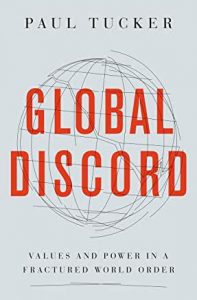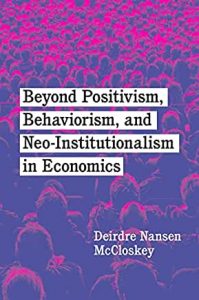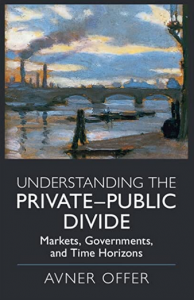October has been whizzing past, with travel to conferences (hooray), the start of term, and a new grandson. I’ve been reading a lot of non-economics books on trains and planes, including Ai Weiwei’s compelling memoir 1000 Days of Joys and Sorrows, Red Dust by Ma Jian, and also a chunky hardback, Orhan Pamuk’s latest novel, Nights of Plague.
Another chunky hardback has been Paul Tucker’s latest, wide-ranging and erudite, book, Global Discord: Values and Power in a Fractured World Order. I must admit it took me some time to get into it, perhaps due to my general October distraction, but I’m with the programme: his aim is to bring a mash-up of David Hume and Bernard Williams to the current fraught state of geopolitics and global crises. The book uses the Humean dual of incentives and norms to think about international economic institutions in place of more traditional International Relations perspectives (realism, constructivism…). As long-time readers of this blog will know, I’m a big Hume fan (although confess to not having read Bernard WIlliams since my student days).
The motivating question is whether a legitimate international order can exist in a world transitioning out of the European/Atlantic order and facing complex existential challenges. Specifically, what international economic arrangements can co-exist with current geopolitics and shifts in power? The book starts with a historical overview of how the current arrangements and structures developed and why the growing power of China has challenged them. The second section looks at what form institutions for international co-operation can take and when/whether they can be stable and self-enforcing – Humean norms and conventions as a lens on international relations feature strongly here. Part three focuses on current tensions within and between China and the US – neither seeming particularly stable internally at the moment, never mind in terms of their mutual relations.
Part four is really the heart of the book: what does the Hume-Williams framework – what will be stable and self-enforcing in its norms, and what will be normatively right – imply for how democracies can legitimately delegate to international organisations, and how such organisations can legitimately constrain individual countries and governments? What are the principles for participation and delegation? How can practical problem solving encourage and sustain norms of behaviour (Hume)? What is its moral basis and hence legitimacy particularly in our still liberal(ish) democracies (Williams)?
The final part moves on to how to apply the framework in the current context, in terms of different more and less opti/pessi-mistic scenarios:lingering status quo, superpower struggle, new Cold War, reshaped world order. Chapters consider different organisations – the IMF, WTO, BIS etc – getting in to how these might evolve. And the book ends with a vote for cautious optimism. (I find it hard to share that view as Brexit continues to destroy British democracy and prosperity, courtesy of the Conservative Party, I must say.)
The breadth of the research (and length of bibliography) across different disciplines is impressive. The book isn’t a light read, but worth while – and there are actually plenty of online events where Paul Tucker himself will give a better summary than I can here. For any day’s news headlines make it clear there could hardly be a more important set of questions to be resolved.






